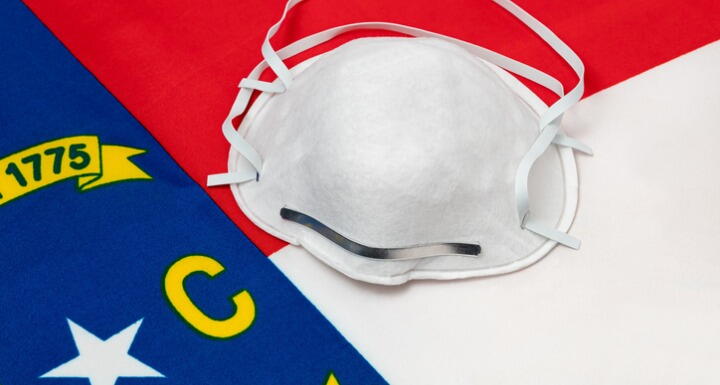An Update on North Carolina Medical Malpractice Law

With an end to the COVID-19 pandemic in sight, it’s hard to forget the terrible impact it had on our society and the tremendous strain it put on our medical community.
Doctors, nurses, and other medical staff fought courageously to care for those affected by the pandemic.
Even during these trying times, there are medical mistakes that happen involving other types of medical care. North Carolinians continue to have access to civil legal remedies when such mistakes happen—by pursuing medical malpractice claims. This article discusses the current state of North Carolina law on medical malpractice cases during the COVID pandemic and also provides a general overview of medical malpractice claims.
The COVID-19 Recovery Act and Certain Immunity for Medical Providers
In May 2020, the North Carolina General Assembly passed the COVID-19 Recovery Act, which included an immunity provision for medical providers. The Act provides limited immunity for medical providers and medical facilities for care “that may result from treatment of individuals during the COVID-19 public health emergency under conditions resulting from circumstances associated with the COVID-19 public health emergency.” For those services covered under the immunity provision, an injured party likely would be legally barred from pursuing a medical malpractice case.
Importantly, the Act does not provide total immunity for all medical care. Under the Act, the health care services must have been directly or indirectly impacted by decisions made because of COVID-19. Further, there is no immunity for gross negligence, reckless conduct, or other heightened types of culpability.
Any immunity only applies to the care during the North Carolina COVID-19 emergency declaration. It does not apply to medical care provided prior to the emergency declaration and will expire once the declaration is lifted.
In sum, there only is limited malpractice immunity for health care providers during the COVID-19 pandemic. Still, the effects of the Act need to be carefully considered by an experienced attorney before an injured party decides to pursue a medical malpractice claim.
The Basics of Medical Malpractice Claims
Assuming there is no applicable immunity, an injured party still must meet the legal requirements of a medical malpractice claim in North Carolina.
In order to do so, the injured party must allege the following legal elements:
- The applicable standard of care;
- The breach of the standard of care by a medical provider;
- That the injuries suffered were “proximately caused” by the breach; and,
- The nature and amount of the resulting damages.
The standard of care is the proper approach, practice, or procedure for a particular medical situation that is accepted by the medical community in a particular geographic location. The standard of care can change depending upon where the medical service was provided or the particular medical condition at issue. A breach of the standard of care means a failure to provide medical treatment consistent with that particular standard. If this failure causes injury, the injured individual (or their family in wrongful death cases) is entitled to damages under the law.
While an injured party should always allege that the medical provider breached the standard of care, they also may argue that a medical provider either (1) failed to use the provider’s best judgment in the treatment or care, or (2) failed to use reasonable care and diligence in the application of the provider’s knowledge and skill to the injured party’s care.
If the injured party proves a breach of the applicable standard of care or the failure to use the provider’s best judgment, knowledge, and skill, the injured party must then prove that their injuries were because of or were “proximately caused” by the breach or failure.
The next step is proving the extent of damages to which the injured party is entitled. Types of damages include compensatory damages and punitive damages.
Compensatory damages are those directly resulting from the injuries. These include medical bills and lost wages, as well as “non-economic” damages such as pain and suffering, which are more subjective in their determination. Punitive damages are intended to punish wrongful conduct and can only be sought when there are aggravating factors, such as willful or wanton conduct. In 2011, the North Carolina General Assembly capped the recoverable amount of non-economic damages at $500,000, indexed to increase with inflation — although there are exceptions for cases involving recklessness or other heightened factors which can support higher awards.
Prosecuting a Medical Malpractice Case
Before an injured individual may file a lawsuit alleging medical malpractice, a qualified expert must review the available medical records. This expert must work in the same specialty at issue in the lawsuit, and the expert must agree to testify that the care provided did not meet the standard of care. If the injured individual does not obtain this initial expert review and does not outline the review in their lawsuit, the matter will be dismissed.
Medical malpractice cases typically are very expert-driven, even beyond the initial review. The injured party needs expert testimony to prove breach of the standard of care or other failures and to prove causation for the damages at issue. Defendants will have their own experts as well. Thus, there typically is a lengthy discovery period during which each side will seek to discover facts related to the alleged malpractice and examine the opinions of the expert or experts of the other party.
North Carolina requires parties to mediate lawsuits, including medical malpractice cases. The mediation is often attempted after discovery and must be conducted before trial. The mediation session will involve a neutral mediator who will help the parties to determine if a voluntary settlement is possible. If the case is not resolved, there will then be a jury trial to determine liability and damages.
Conclusion
Medical malpractice claims are complex, and the applicable body of law is technical and potentially complicated. The COVID-19 pandemic has added to this complexity in North Carolina. If an injured person or their family member believes they have a medical malpractice claim, the best course of action is to contact an attorney as soon as possible.
—
© 2022 Ward and Smith, P.A. For further information regarding the issues described above, please contact Lynwood P. Evans or Jeremy M. Wilson.
This article is not intended to give, and should not be relied upon for, legal advice in any particular circumstance or fact situation. No action should be taken in reliance upon the information contained in this article without obtaining the advice of an attorney.
We are your established legal network with offices in Asheville, Greenville, New Bern, Raleigh, and Wilmington, NC.
Featured News
View All
